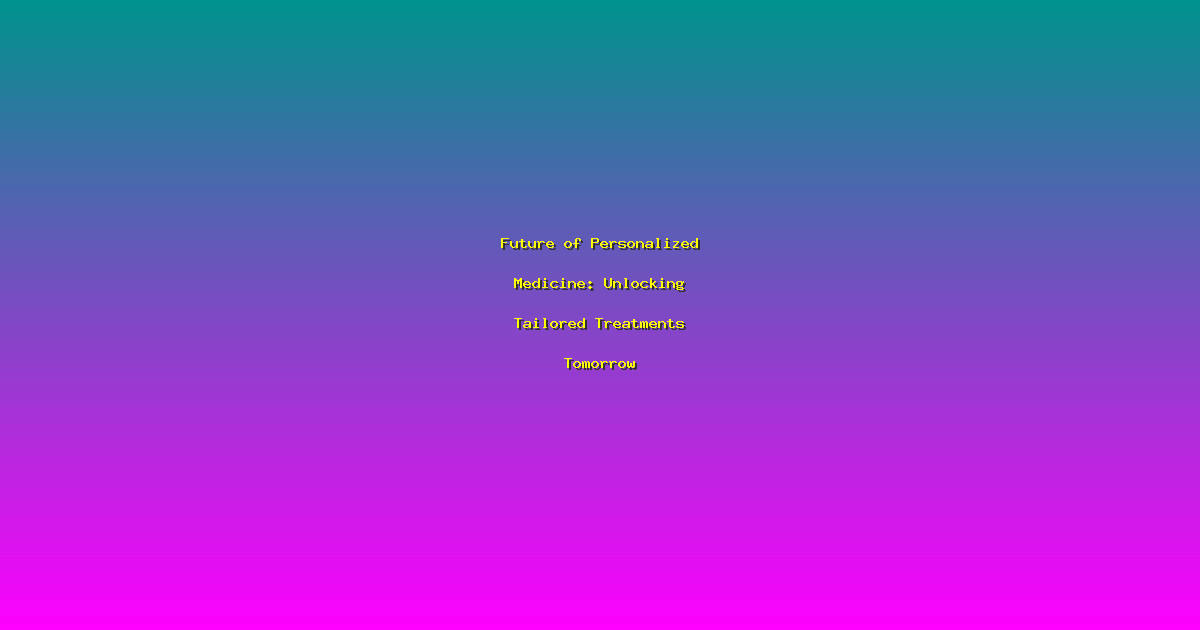Future of Personalized Medicine: Unlocking Tailored Treatments Tomorrow
Imagine a world where medical treatments are custom-tailored to your unique genetic makeup, maximizing efficacy and minimizing side effects. This vision is not just a futuristic dream; it's the promise of personalized medicine, a field that stands on the cusp of transforming healthcare as we know it. As we delve into the future, the potential of personalized medicine to revolutionize treatment approaches is becoming increasingly apparent.
The Evolution of Personalized Medicine
The journey towards personalized medicine began with the Human Genome Project, a monumental effort to map and understand human DNA. Since then, advancements in genomics, bioinformatics, and artificial intelligence have accelerated the pace of progress. Today, personalized medicine is no longer science fiction but a reality that is gradually integrating into mainstream healthcare practices.
How Personalized Medicine Works
At its core, personalized medicine involves analyzing a patient's genetic information to determine the most effective treatment plan. By understanding genetic variations, doctors can predict how patients will respond to certain medications, identify the root causes of diseases, and even prevent conditions from developing. This approach not only enhances treatment outcomes but also reduces the risk of adverse reactions and unnecessary treatments.
The Future Landscape
Looking ahead, the future of personalized medicine promises even more sophisticated and precise treatments. Innovations such as CRISPR gene editing, nanotechnology, and real-time health tracking devices will further enhance the ability to customize care. These technologies will enable healthcare providers to diagnose diseases earlier, monitor patient responses to treatments more accurately, and tailor therapies more precisely to individual needs.
Challenges and Considerations
Despite its potential, personalized medicine faces several challenges. Accessibility and cost are significant barriers, with advanced genetic testing and treatments often being expensive. Additionally, there are ethical concerns regarding privacy and the use of genetic information. Addressing these issues will be crucial for the successful integration of personalized medicine into healthcare systems worldwide.
FAQs
Q: How does personalized medicine differ from traditional medicine?
Personalized medicine utilizes individual genetic information to tailor treatment, whereas traditional medicine applies a more general approach based on population data.
Q: What types of diseases can benefit from personalized medicine?
Personalized medicine can be beneficial across a broad spectrum of diseases, including cancer, cardiovascular diseases, and neurological disorders, by targeting therapies more effectively.
Q: Is personalized medicine safe?
Safety is a paramount concern. Extensive research, clinical trials, and regulatory oversight are crucial to ensure that personalized treatments are both safe and effective.
Q: What are the ethical implications of personalized medicine?
There are concerns about data privacy, genetic discrimination, and the equitable distribution of benefits. Addressing these ethical challenges is critical to the ethical application of personalized medicine.
Q: How can I access personalized medicine services?
Access varies by location and healthcare system. It's advisable to consult with healthcare providers who specialize in personalized or precision medicine for guidance.
Conclusion and Call to Action
The future of personalized medicine holds immense promise, offering the potential to revolutionize healthcare by providing more effective, safer, and more targeted treatments. As the technology continues to evolve, it is essential for patients, healthcare providers, and policymakers to work together to ensure that the future of personalized medicine is accessible, equitable, and ethically sound. Join the movement towards a future where healthcare is tailored to the individual, ensuring that each person receives the best possible care.

